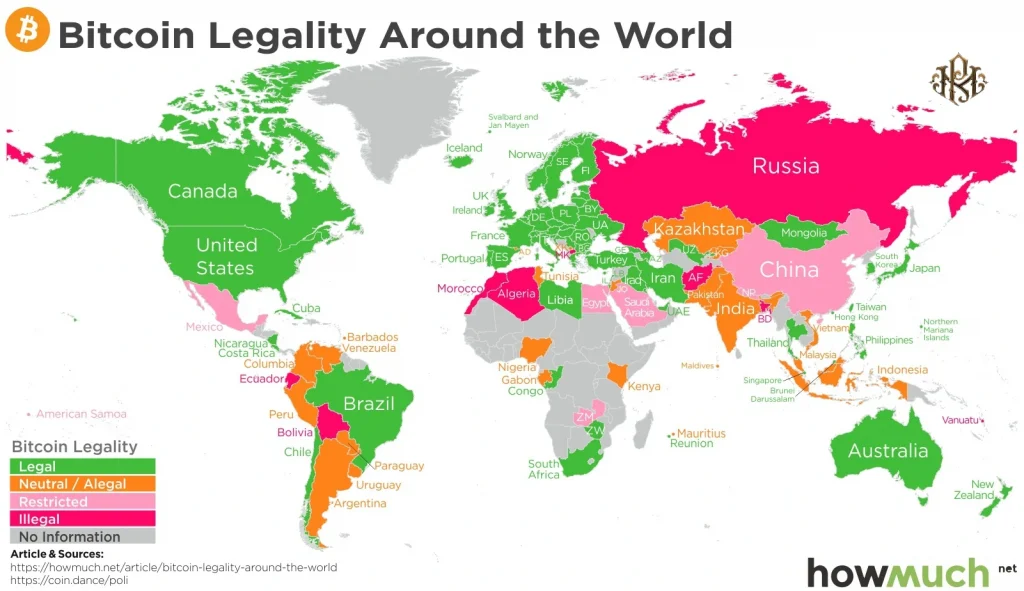
Close



Bitcoin and digital currency are legal and illegal in which countries?
The peer-to-peer digital currency Bitcoin was introduced in 2009 and introduced the concept of decentralized finance to the world. While tax authorities, enforcement agencies and global financial regulators are still debating how to control and monitor it, many consumers want to know if Bitcoin can be used legally. And whether Bitcoin is legal in their country or not.
Whether or not you can use Bitcoin depends on your country. We talk about the legal status of Bitcoin and how it is recognized by countries around the world.
Article perspective
Bitcoin digital currency has created financial concerns for governments around the world.
Despite its use to purchase goods and services, there are still no clear international laws governing Bitcoin.
Many developed countries, such as the United States, Canada, and the United Kingdom, allow the use of Bitcoin.
Several countries, including China and Egypt, have also outlawed the use of Bitcoin
Countries where Bitcoin is legal
Bitcoin in the countries of the world
Bitcoin can be used anonymously to transact worldwide. This issue has caused some currency concerns for governments. As some legislators and authorities may not support Bitcoin due to the lack of control and illicit ties, many have enacted regulations under their country’s Anti-Money Laundering and Countering the Financing of Terrorism (AML/CFT) laws to Don’t use coins in these fields.
The Library of Congress (LOC) regularly reviews and reports on countries’ positions on Bitcoin and digital currencies. As of November 2021, 103 countries were reported to have enacted regulations on cryptocurrencies and their use in AML/CFT.
LOC also identified many countries where the use of digital currencies is free. In the following, we mention some of these countries.
The US Department of the Treasury’s Financial Crimes Enforcement Network (FinCEN) has issued regulations on Bitcoin since 2013. The Treasury Department has recognized Bitcoin as a convertible currency with an equivalent value in real currency or a currency that can act as a substitute for real currency.
European Union
Bitcoin in UK and Europe
The European Union recognizes Bitcoin and other digital currencies as cryptocurrencies. Bitcoin is not illegal to use in the EU. But the European Banking Authority, the currency regulator in the union, has said that crypto-asset activities are outside its control. They also warn people and businesses about the dangers of digital currencies
Like its southern neighbor, Canada has a positive attitude towards Bitcoin. this means; Any income from a transaction using Bitcoin is considered business income or capital gain and must be reported as such.
Like Canada, the Australian Taxation Office considers Bitcoin a valuable financial asset that can be taxed when certain events occur. If you trade, exchange, sell, gift, convert to fiat currency, or use Bitcoin for purchases, capital gains tax will apply. You should also keep records of any transactions you make using Bitcoin for tax purposes.
El Salvador is the only country in the world that has declared Bitcoin as legal tender. In June 2021, the country’s Congress officially accepted Bitcoin as a form of payment.
Several other countries also allow the use of Bitcoin in transactions. They have adopted regulations to monitor and control it. Some of these countries are:
Denmark
France
Germany
Iceland
Japan
Mexico
Spain
England
Countries where Bitcoin is illegal at all
Bitcoin legal validity in countries
While Bitcoin has been welcomed in many parts of the world, several countries are concerned about its volatility and decentralized nature. Some also see it as a threat to their current monetary systems. On the other hand, they are worried about using it to support illegal activities such as drug trafficking, money laundering and terrorism. Several countries have also banned digital currency altogether. Others have tried to cut off any banking and financial system support necessary to trade and use it.
In its November 2021 update, the Library of Congress listed 42 countries with conditional bans on digital currencies. That is, bitcoin is not legal in these countries, but it is not illegal and not punishable either.
Bahrain
Iran
Burundi
Cameron
Central African Republic
Gabon
Georgia
Guyana
Kuwait
Lesotho
Libya
Macao
Maldives
Vietnam
Zimbabwe
Countries with absolute bans
Algeria
Bangladesh
china
Egypt
Iraq
Morocco
Nepal
Diameter
Tunisia

Investing in digital currencies is very risky and sometimes lucky. This article is not a suggestion by the digital currency site or the author to invest in digital currencies. from there
Digital Currency does not make any guarantees as to the accuracy of the information contained herein.